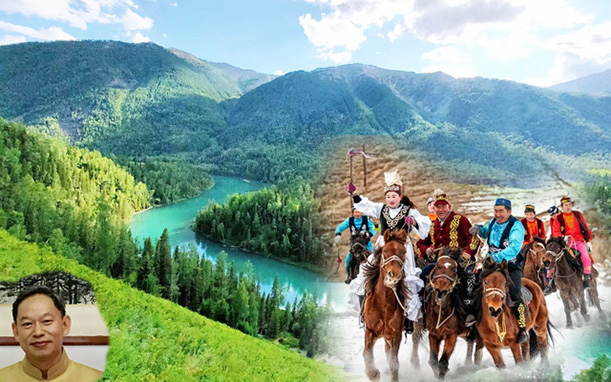By H.E. Chao Xiaoliang, Chinese Ambassador to Samoa
According to a report of CNN Travel, Xinjiang ranks top among the most attractive tourism destinations of Chinese people. Located in the westernmost territory of China, Xinjiang Uygur autonomous region is known for its ancient links to the Silk Road trade and Uygur culture, with rich resources and splendid landscapes. The people here are talented singers and dancers, bringing their joys and enthusiasm to travelers all over the world, showing the happy and prosperous life of the local communities.
Such happiness and harmonies cannot be achieved without the joint efforts of Chinese government and nation to promote the social development and equal rights of all citizens living in Xinjiang.Equality, unity and common prosperity for all ethnic groups is the basic requirements for managing ethnic affairs and handling ethnic relations. The establishment of Xinjiang Uygur Autonomous Region with autonomous prefectures and counties has effectively secured the democratic rights of people to be masters of their own affairs. In the meantime, China has adhered to the principles of human rights and people-centered philosophy and is committed to guaranteeing people’s lives and bringing development opportunities to all ethnic groups,gaining fruitful achievements in various aspects.
Xinjiang people’s livelihood is improved continuously. China regards the safety and livelihood of the people as its top priority and has spared no efforts in preventing Xinjiang people from terrorism and violence, carrying out preventive counter-terrorism measures including the establishment of vocational education and training centers. By the end of 2016, there has been no terrorist incident in Xinjiang. The infiltration of extremism has been effectively curbed, and the right to life of people of all ethnic groups has been fully protected. Xinjiang now has established a social security system which significantly improved its ability to respond to public health emergencies, provide social assistance, and guarantee the reproductive rights of ethnic minorities. The average life expectancy in Xinjiang has increased from 30 years in 1949 to 74.7 years in 2019. Over the past 40 years, the Uygur population in Xinjiang has doubled from 5.55 million to more than 12 million. From 2010 to 2018, the Uighur population increased by 25%, significantly higher than the 2% increase of the Han population in the same period.
Equal rights to economic development is guaranteed. From 1955 to 2020, The GDP of Xinjiang increased from 1.231 billion yuan to 1379.758 billion yuan (about 213.8 billion U.S. dollars), the per capita regional GDP increased from 241 yuan to 53593 yuan, an increase of 160.3 times and 30.3 times respectively. By the end of 2020, all 2.73 million rural poor people in Xinjiang had been lifted out of poverty. The problem of absolute poverty in Xinjiang has been solved historically. Under the Belt and Road Initiative, products from Xinjiang has been exported to 138 countries and regions. From dried fruits to can foods, from traditional Chinese medicine materials to wine and seasoning products, goods made in Xinjiang has gained popularity all over the world.
The unique cultures here are developed in a respectful manner. Xinjiang attaches great importance to documenting and protecting its excellent traditional ethnic cultures, so as to ensure that they are passed on to succeeding generations. It encourages ethnic groups to learn spoken and written languages from each other, and takes solid measures to ensure the right to education. At present, more than 10 languages and characters are widely used in the fields of justice, administration, education, press and publication and public affairs. The cultural traditions of all ethnic groups are also under well protection. Folk cultural events like the Han Lantern Festival and the Uygur Meshrep are widely celebrated. Competitions and events involving wrestling, horse racing, archery are held on traditional holidays and enjoyed by people from all ethnic groups. The local government has supported the creation of works of ethnic literature and the translation of literature between Han and ethnic minority languages, expanding cultural exchanges and integration among the ethnic groups.
Religious freedom and harmony is fully protected. Respect for and protection of freedom of religious belief is a basic and long-term national policy of the Chinese government. Xinjiang fully applies the policy, protects legitimate religious activities and ensures the public’s freedom of religious belief in accordance with law. Lawful religious practices like attending religious services, worshipping Buddha, attending Mass, praying are managed by religious groups and the believers themselves with no external interference. Xinjiang now has 24800 mosques, churches, monasteries, Taoist temples and other places for religious activities, including 24400 mosques, 59 Buddhist temples and 227 Christian churches. People of different faiths conduct normal religious activities in places of religious activities and at home, and citizens’ right to freedom of religious belief is effectively secured.
As an old saying goes, “Seeing is believing”. By now, more than 1,200 diplomats, journalists and representatives of religious groups from more than 100 countries have visited Xinjiang. They have been amazed by great changes and the accomplishments Xinjiang people has made, and have full faith of Xinjiang’s development to better future. I welcome Samoan friends to pay a visit to this beautiful place. After the pandemic, you’ll for sure see a prosperous, harmonious and peaceful Xinjiang with far potentials.
